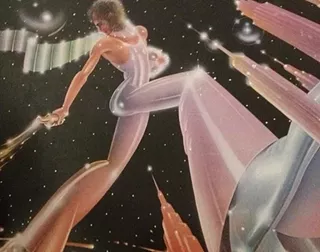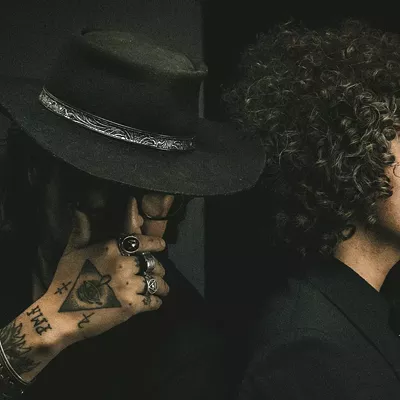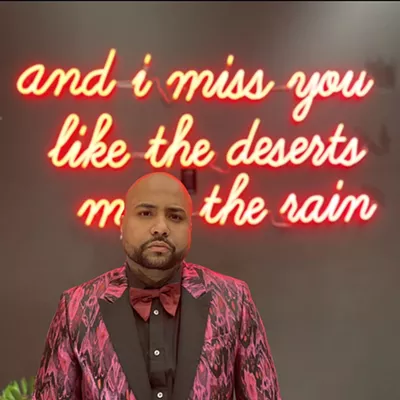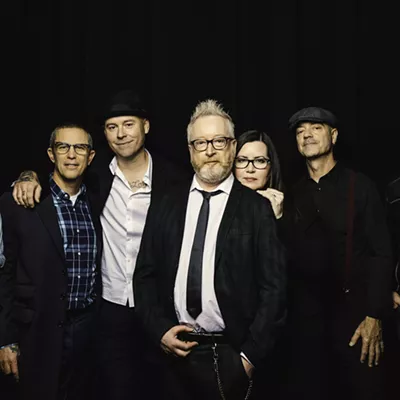After releasing 2004's electro-straddling, genre-hopping, award-winning debut album Desperate Youth, Blood Thirsty Babes, the trio hit the road, recruited two new members (Jaleel Bunton on drums and Gerard Smith on bass) and began recording their sophomore album, Return to Cookie Mountain. The album, which has been pushed back from its original 2005 release date, is composed of wildly erratic and consistently innovative tunes that make their drugged, dazed and brilliant debut sound tame by comparison.
Meanwhile, TV on the Radio have kept busy, with this year's calendar quickly filling up. Having signed to a major label (Interscope), the group will perform at this month's Coachella Festival, embark on a brief summer stadium tour with new labelmates Nine Inch Nails, and release one of the year's best albums this June.
In other words, if the often musically difficult and attention-shunning TV on the Radio are not careful, they're going to have a lot of new fans by year's end. During a recent phone interview with the sleep-deprived Kyp Malone, he took it all in stride. Mostly, he seemed genuinely excited about the variety of challenges the year presents, including playing and adapting the group's new material for small clubs, stadiums and festival grounds.
"Whether it's 12 people or 12,000 people, they're different experiences that are equally as rewarding, as far as I'm concerned," Malone said. "Creatively, if you can captivate a crowd at a big festival, it feels like you're flying. But if you can communicate and share something to 15 people in a room--in a little dive bar, everyone there on the same page--and feel like you're communicating it, then that's a fucking feat as well."
Malone and company can take comfort in the knowledge that, project to project, their music manages to remain indefinable, yet intriguing and rewarding in the eager-to-please indie community. The group should not lose any fans with Return to Cookie Mountain, which avoids the sophomore curse, despite the fact that TV on the Radio are now a more-seasoned band.
"We had a lot more time and access to more and bigger and shinier tools," Malone said. "It was just more people walking into it more confident, and although it was different in many ways, the writing remained the same."
The band's lyrics, a genial mix of classical, absurdist poetry and veiled metaphors (ranging from politics to love), have always been the primary reward of their occasionally difficult and often dense musical innovations. However, Return to Cookie Mountain finds the band embracing the spaced-out weirdness of their previous racket-making while showing meticulous attention to the album's vocals. In fact, one of the group's biggest fans, David Bowie, was so impressed, he agreed to collaborate.
"When we were working on the new songs, we dropped them all off for him to listen to and invited him to be a part of whatever he wanted to be a part of," Malone said. "He wanted to be a part of that song, so he came in and sang on it."
"Province," the song in question, is a swirling, doo-wop anthem that achieves the kind of soaring heights that are instantly enjoyable--the type that TV on the Radio generally shy away from, usually opting instead for songs so packed and layered that only truly attentive listeners will recognize their complete glory. Nonetheless, as Bowie and the band's vocals collide, yelp and rise, the song shines through not as an obligatory guest spot, but as a hauntingly memorable, post-apocalyptic masterpiece.
"It was more surreal, not intimidating," he said. "I never expected to be in a situation where I'm at a mixing board asking David Bowie to enunciate a consonant."
Vocal layers and guest spots aside, one of the band's primary abilities is its finesse in skewering and brazenly critiquing the politics of the United States. Through opaque couplets and choruses, the group consistently takes umbrage with the current administration's policies, or lack thereof.
"The negative repercussions of foreign policies and environmental policies are something we're gonna have to contend with for the rest of our lives and the rest of our children's lives," Malone said. "We can't pretend like it's not there and like it's not a big deal, because that's grossly irresponsible."
Instead, the group took things head-on with "Dry Drunk Emperor," a free MP3 posted on the band's Web site following the government's delayed response toward Hurricane Katrina.
"That song was about the Iraq War primarily," Malone said. "We had been working on that and reworking the lyrics and reworking the lyrics, trying to get it together, and we were on the verge of finishing tracking it when the hurricane hit the Gulf Coast. It's lyrically about the Iraq war, but it's all part of the same mentality, of the same fucking people. I guess it's an easy thing to take potshots at fucking monkeys in the White House and ignore the responsibilities that we all hold as citizens of this country, but there are certainly, for sure, some people who need to pay--who have more blood on their hands."
Indeed, Return to Cookie Mountain furthers the group's political agenda with enough intentional reticence to avoid sounding preachy. It's the balance between addressing the important and maintaining the artistic that has earned TV on the Radio a slot in the recent Rolling Stone "10 Artists to Watch" list; an honor that Malone took with curious appreciation.
Dubious pleasures and political rants aside, the group remains firmly planted on terra firma and still gets excited by the little things. For example, Malone, who--in a sign of the group's constant activity--was initially unaware of fellow Coachella acts, admitted to a kind of fandom toward fellow performer Madonna.
"That would be good to see her," Malone said. "I used to masturbate to images of her when I was young."














